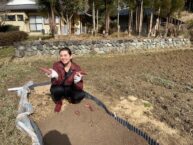For my CIP, I participated in two different groups that work on 町おこし, or town revitalization, in the countryside outside of Kyoto. One of the groups was the Nantan Regional-Revitalization Cooperative, where I shadowed their young farming representative, Yoshida-san. The other group was the Kyoto Seika University Takarasagashikai, a student circle that works revitalizing the town of Utsu, in the northern countryside of Kyoto, under the supervision of Humanities Professor Tamura sensei. As I was participating in two different groups, I alternated visiting one group per week, sometimes visiting both in the same week. Combining my CIP with my independent research on Japanese town revitalization, I used it as an opportunity to conduct ethnographic fieldwork by meeting and talking with a variety of people involved in such efforts.
Because of the multi-faceted nature of my CIP, every day was different. On the days that I participated in the Nantan Regional-Revitalization Cooperative, I would take the JR train about half an hour outside of Kyoto to Sonobe, Nantan. There, Yoshida-san would pick me up and tell me the day’s activities. Yoshida-san’s farming specialty is sweet potatoes, so one day I helped him bury last year’s leftover sweet potatoes, in order to form new sprouts for this year’s crop. He also took me to meet one of his neighbors, a farmer who has kindly welcomed Yoshida-san into the Nantan community and given him a lot of practical farming advice. One day Yoshida-san took me to an 朝市, or morning market, which functions both as a farmer’s market and community gathering space. There I had the incredible opportunity to chat with and interview several community leaders, and witness 炭焼き, traditional charcoal-making, in action. For the Seika University Takarasagashikai, I attended two club meetings, and also visited Utsu’s morning market once. One thing I really enjoyed about the Takarasagashikai was having the opportunity to interact with students my age. The club had a casual and fun atmosphere, and there was a lot of joking and chatting as we put together an informational pamphlet about their club and planned activities and games to play with the kids of Utsu at an upcoming retreat.
Overall, I was blown away by the warmth and welcome I received from everybody I met. Though neither group had ever had an exchange student participant before, both Yoshida-san and Tamura sensei worked to accommodate me and kindly found me many opportunities to talk to different people. Thus, through my CIP I had the chance to use Japanese in a variety of settings with people of all different ages, some of whom had strong regional dialects. It was incredibly special to be able to get different local people’s perspectives on the declining countryside population, and hear what they think can be done about it. Another thing I valued about my CIP was that it enabled me to get out of the city and enjoy the breathtakingly beautiful mountains and forests of the surrounding countryside.
Even for those who aren’t researching town revitalization, I would highly recommend the Nantan Regional-Revitalization Cooperative to anybody who wants the opportunity to experience the Japanese countryside, and I would recommend the Takarasagashikai to anybody who wants to interact with a very fun group of college students. Though it was cut short, my CIP was hands down the best part of my study abroad in Kyoto.

Hi Mira! Your CIP sounds very interesting! It’s great that you got the opportunity to see a completely different side of Japan and learn about the Japanese countryside. I also think it’s fantastic that you utilized your CIP to go along with your independent research on town revitalization, and it seems like you really got a lot out of your time in Kyoto! I’m curious about what the local people had to say about the declining countryside population and if there was anything in particular you were surprised to hear.
I think you really got the experience that the CIP project aimed to give you! It seems like you got to interact with some really cool people and completely immerse yourself in the culture—which I can imagine makes your ethnographic work easier—and have some very new, unforgettable experiences! Were you surprised at all by the things people were doing to address declining countryside population? Very cool that you got the chance to interact with people of all ages and in varying situations!